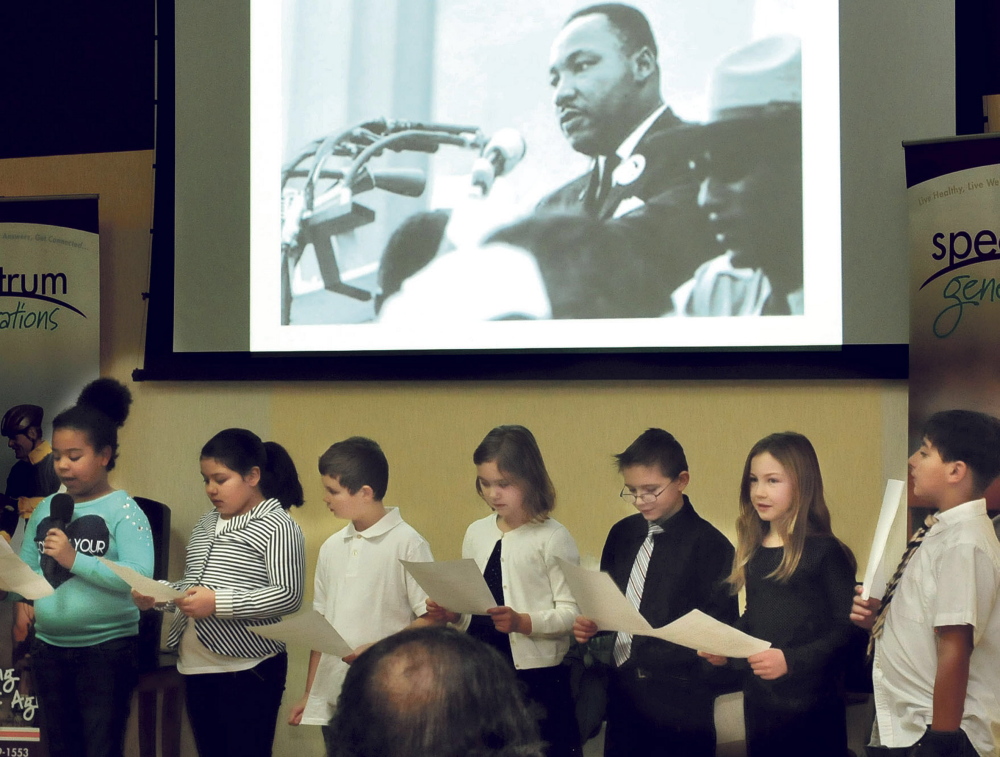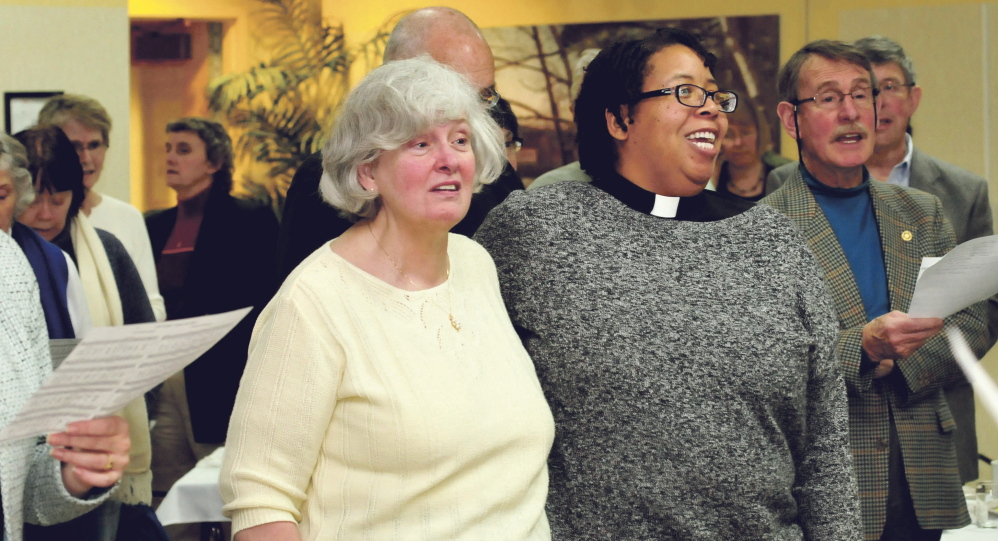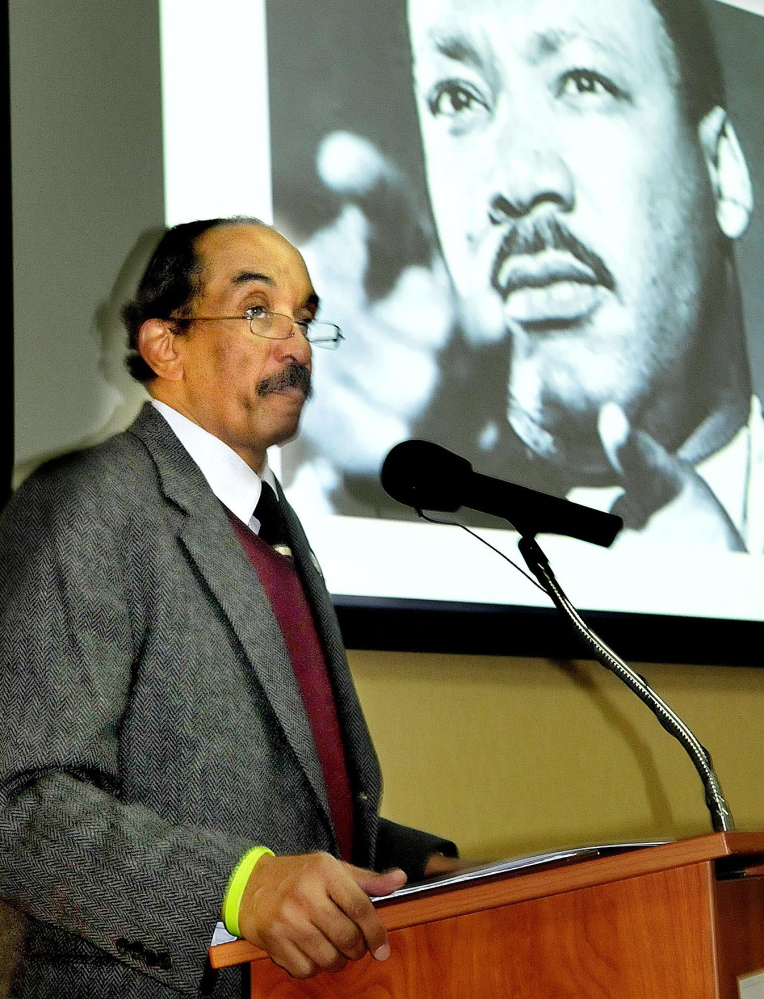WATERVILLE — Martin Luther King Jr. had the ability to see the big picture — he had a vision and was able to communicate that vision.
He had an undeterred focus and never wavered in his commitment to making racial equality a reality. He did not see problems, he saw only opportunities.
Those were the observations of Thomas College education professor Richard Biffle III, who expounded on King’s leadership qualities Monday at the 29th annual Martin Luther King Jr. Community Breakfast at Spectrum Generations’ Muskie Center.
About 130 people, including Gov. Paul LePage, attended the breakfast, co-sponsored by Spectrum Generations and the Waterville Rotary Club.
Biffle, a former national staff member of the National Association for the Advancement of Colored People, told the audience that King set and adhered to a higher standard for what the road to achieving racial equality would look like — not using violence and not being predictable.
King, who was killed by James Earl Ray in 1968 in Memphis at 39, would have been 86 today, Biffle noted.
“I’m amazed at how much he accomplished in such a short period of time,” he said.
King used eloquence, persuasion, passion, reason and practicality as plans of action and choice to win over the hearts of friends and foes alike, according to Biffle.
“He had the ability to admit fear, face it and overcome it,” he said. “He learned how to manage fear and anxiety.”
Biffle said he came to view King’s leadership in an artistic sense, seeing it as similar to the evolution of a tapestry.
The tapestry analogy was triggered by Biffle’s visit to Blenheim Palace in England, the home of Winston Churchill.
“I was awestruck by the opulence of such a living place, but particularly the family history via tapestries,” he said.
Biffle said he saw the United States as such a tapestry, a continual work in progress in which “the threads of the designs are ideas, theories, philosophies and ways of being associated with social justice, equality, freedom and democracy.”
COMMUNITY ATTENDS
Civil rights activists, city officials including councilors and Mayor Nick Isgro, students and others attended the breakfast.
Before it began, LePage, at his first Waterville breakfast since 2012, spoke with reporters about King, who he called a breath of fresh air during the 1960s.
“When everybody else was rioting, we had the Black Panthers and Malcolm X, he was a very relaxed leader and a very peaceful speaker.”
LePage said he thinks the issue in this society is less about race and more about class. When he was a child growing up in Maine, people were discriminated against because they were French; people also were discriminated against for being poor, LePage said.
“The French were not welcome when they came down from Quebec,” he said.
LePage, a former city councilor and mayor, said he enjoys coming to Waterville for the annual King breakfast. “I know people here,” he said. “I’m not a stranger. It’s just a good place.”
He regularly attended the Waterville breakfast through 2012 and in 2011 caused a stir shortly after his first inauguration, when he declined an invitation from the Portland Branch of the NAACP to attend a breakfast in that city. Pressed on why he was declining, LePage said at the time that he would not be held hostage by special interests. LePage added, “Tell ’em to kiss my butt'” if they want to “play the race card.”
He declined a similar invitation from the Portland NAACP in 2012, saying he had committed to attending the Waterville event.
Monday, he also chatted with reporters about what he planned to do on his day off.
“Today I’m going to work on the house,” he said. “We got this really cool house in Boothbay — it’s a real super deal.”
He said he is putting a woodworking shop together at the house so he can start making furniture for his daughter, Lauren, who is engaged to be married to Jordan Larley, a teacher at Mount View High School in Thorndike.
The wedding will be in the fall, and the couple has already bought a house in Waterville, he said.
Steve Aucoin, a former city councilor who ran unsuccessfully for mayor in November, also is a regular attendee of the breakfast.
A civil rights activist for many years, Aucoin said that when he was a college student in Bridgeport, Conn., he worked in the projects, helping minorities register to vote. He also helped set up an after school program for children in the projects.
“That was the beginning of my activism,” Aucoin said. “It grew from there.”
Aucoin’s former wife, Terry Ann Lunt-Aucoin, was director of the Maine Human Rights Commission, and they went to Washington County where they advocated for Indians who were working for minimal wages raking blueberries on the blueberry barrens.
Aucoin said when King was killed, civil rights activists “knew it was the end.”
“We knew that they’d be willing to kill us to stop things from changing,” Aucoin said. “No one ever believed that James Earl Ray acted alone. I don’t believe it to this day.”
Aucoin, 68, ran the electoral campaign for the first elected black official in the Maine Legislature, Gerald Talbot, who was elected to the state House of Representatives in 1972. He said he attends the King breakfast each year “because there’s an awful lot still to be done.”
Third grade students from George J. Mitchell School, attending with school librarian Edie Keller, spoke about their dreams.
Kiara Deane, Gabriella Garcia-Pollis, Jace Bryan, Julia Scott, Jacob Burton, Devin Emery and Beatrice Beal-Tate said they wished for peace instead of war, that all people be treated the same way and that people not smoke.
Waterville Rotary Club president Len LeGrand welcomed the crowd. Gerard Queally, president and chief executive officer of Spectrum Generations, was master of ceremonies and the Rev. Effie McClain of the Oakland/Sidney United Methodist Church gave the invocation.
Song leader was the Rev. David Anderman, retired pastor of the First Congregational Church of Waterville, who played keyboard. Waterville attorney Dan Eccher sang, including a rendition of “Were You There?” The Rev. Mark Wilson, of the Congregational Church, gave the benediction.
Black and white slides of King were shown continuously on the wall behind the podium. Quotes from King were printed on the slides, including one that said, “I have decided to stick with love; hate is too great a burden to bear.”
Amy Calder — 861-9247
Twitter: @AmyCalder17
Send questions/comments to the editors.







Success. Please wait for the page to reload. If the page does not reload within 5 seconds, please refresh the page.
Enter your email and password to access comments.
Hi, to comment on stories you must . This profile is in addition to your subscription and website login.
Already have a commenting profile? .
Invalid username/password.
Please check your email to confirm and complete your registration.
Only subscribers are eligible to post comments. Please subscribe or login first for digital access. Here’s why.
Use the form below to reset your password. When you've submitted your account email, we will send an email with a reset code.